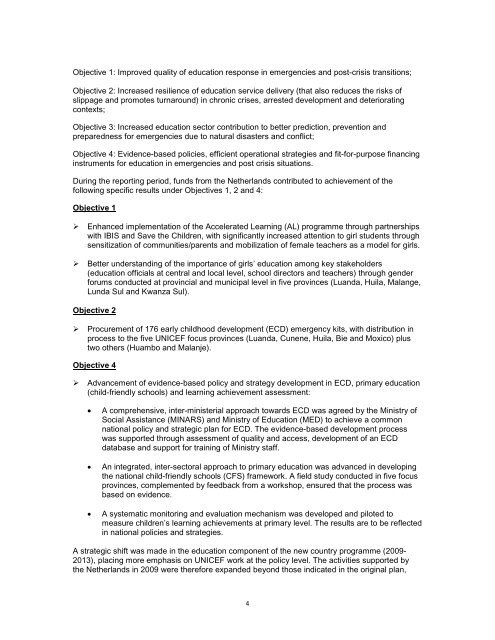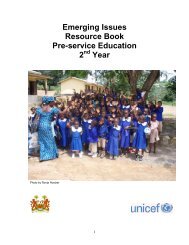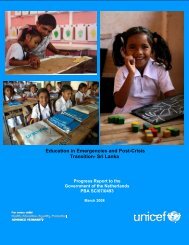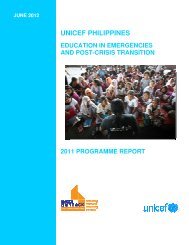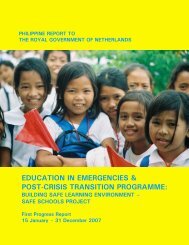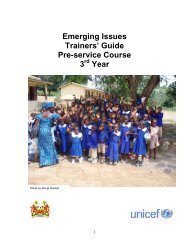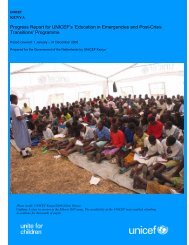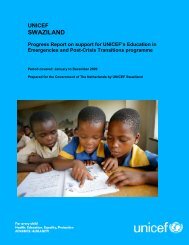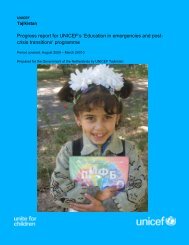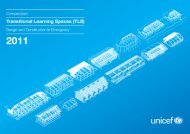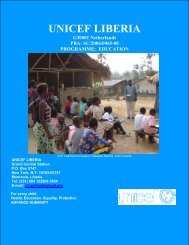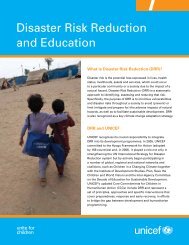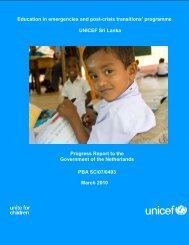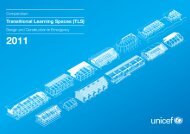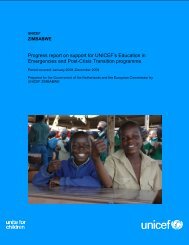Angola Progress Report 2009
Angola Progress Report 2009
Angola Progress Report 2009
Create successful ePaper yourself
Turn your PDF publications into a flip-book with our unique Google optimized e-Paper software.
Objective 1: Improved quality of education response in emergencies and post-crisis transitions;<br />
Objective 2: Increased resilience of education service delivery (that also reduces the risks of<br />
slippage and promotes turnaround) in chronic crises, arrested development and deteriorating<br />
contexts;<br />
Objective 3: Increased education sector contribution to better prediction, prevention and<br />
preparedness for emergencies due to natural disasters and conflict;<br />
Objective 4: Evidence-based policies, efficient operational strategies and fit-for-purpose financing<br />
instruments for education in emergencies and post crisis situations.<br />
During the reporting period, funds from the Netherlands contributed to achievement of the<br />
following specific results under Objectives 1, 2 and 4:<br />
Objective 1<br />
‣ Enhanced implementation of the Accelerated Learning (AL) programme through partnerships<br />
with IBIS and Save the Children, with significantly increased attention to girl students through<br />
sensitization of communities/parents and mobilization of female teachers as a model for girls.<br />
‣ Better understanding of the importance of girls’ education among key stakeholders<br />
(education officials at central and local level, school directors and teachers) through gender<br />
forums conducted at provincial and municipal level in five provinces (Luanda, Huila, Malange,<br />
Lunda Sul and Kwanza Sul).<br />
Objective 2<br />
‣ Procurement of 176 early childhood development (ECD) emergency kits, with distribution in<br />
process to the five UNICEF focus provinces (Luanda, Cunene, Huila, Bie and Moxico) plus<br />
two others (Huambo and Malanje).<br />
Objective 4<br />
‣ Advancement of evidence-based policy and strategy development in ECD, primary education<br />
(child-friendly schools) and learning achievement assessment:<br />
• A comprehensive, inter-ministerial approach towards ECD was agreed by the Ministry of<br />
Social Assistance (MINARS) and Ministry of Education (MED) to achieve a common<br />
national policy and strategic plan for ECD. The evidence-based development process<br />
was supported through assessment of quality and access, development of an ECD<br />
database and support for training of Ministry staff.<br />
• An integrated, inter-sectoral approach to primary education was advanced in developing<br />
the national child-friendly schools (CFS) framework. A field study conducted in five focus<br />
provinces, complemented by feedback from a workshop, ensured that the process was<br />
based on evidence.<br />
• A systematic monitoring and evaluation mechanism was developed and piloted to<br />
measure children’s learning achievements at primary level. The results are to be reflected<br />
in national policies and strategies.<br />
A strategic shift was made in the education component of the new country programme (<strong>2009</strong>-<br />
2013), placing more emphasis on UNICEF work at the policy level. The activities supported by<br />
the Netherlands in <strong>2009</strong> were therefore expanded beyond those indicated in the original plan,<br />
4


